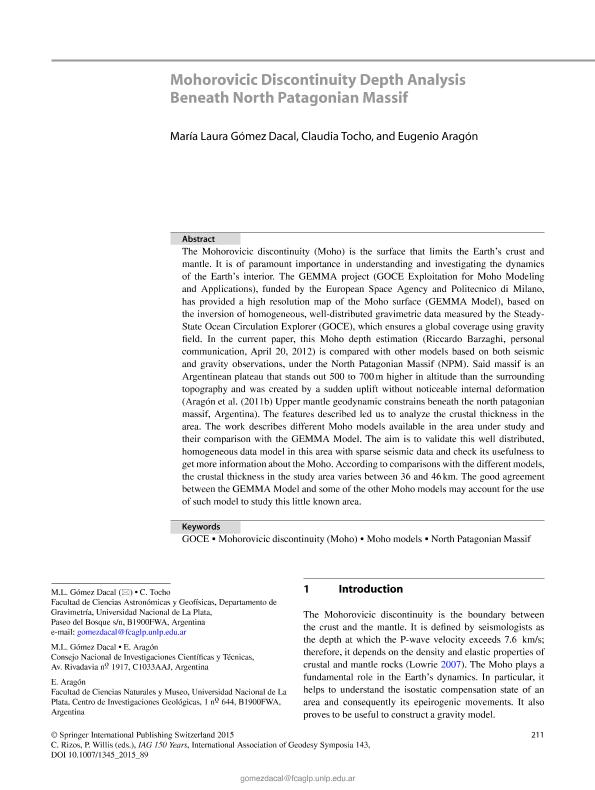Mostrar el registro sencillo del ítem
dc.contributor.author
Gómez Dacal, María Laura

dc.contributor.author
Tocho, Claudia

dc.contributor.author
Aragon, Eugenio

dc.date.available
2018-08-09T19:56:39Z
dc.date.issued
2016-01
dc.identifier.citation
Gómez Dacal, María Laura; Tocho, Claudia; Aragon, Eugenio; Mohorovicic discontinuity depth analysis beneath north patagonian massif; Springer; International Association of Geodesy Symposia; 143; 1-2016; 211-218
dc.identifier.isbn
978-3-319-24603-1
dc.identifier.issn
0939-9585
dc.identifier.uri
http://hdl.handle.net/11336/54865
dc.description.abstract
The Mohorovicic discontinuity (Moho) is the surface that limits the Earth’s crust and mantle. It is of paramount importance in understanding and investigating the dynamics of the Earth’s interior. The GEMMA project (GOCE Exploitation for Moho Modeling and Applications), funded by the European Space Agency and Politecnico di Milano, has provided a high resolution map of the Moho surface (GEMMA Model), based on the inversion of homogeneous, well-distributed gravimetric data measured by the Steady- State Ocean Circulation Explorer (GOCE), which ensures a global coverage using gravity field. In the current paper, this Moho depth estimation (Riccardo Barzaghi, personal communication, April 20, 2012) is compared with other models based on both seismic and gravity observations, under the North Patagonian Massif (NPM). Said massif is an Argentinean plateau that stands out 500 to 700m higher in altitude than the surrounding topography and was created by a sudden uplift without noticeable internal deformation (Aragón et al. (2011b) Upper mantle geodynamic constrains beneath the north Patagonian massif, Argentina). The features described led us to analyze the crustal thickness in the area. The work describes different Moho models available in the area under study and their comparison with the GEMMA Model. The aim is to validate this well distributed, homogeneous data model in this area with sparse seismic data and check its usefulness to get more information about theMoho. According to comparisons with the different models, the crustal thickness in the study area varies between 36 and 46 km. The good agreement between the GEMMA Model and some of the other Moho models may account for the use of such model to study this little known area.
dc.format
application/pdf
dc.language.iso
eng
dc.publisher
Springer

dc.rights
info:eu-repo/semantics/openAccess
dc.rights.uri
https://creativecommons.org/licenses/by-nc-sa/2.5/ar/
dc.subject
Goce
dc.subject
Moho Models
dc.subject
Mohorovicic Discontinuity (Moho)
dc.subject
North Patagonian Massif
dc.subject.classification
Meteorología y Ciencias Atmosféricas

dc.subject.classification
Ciencias de la Tierra y relacionadas con el Medio Ambiente

dc.subject.classification
CIENCIAS NATURALES Y EXACTAS

dc.title
Mohorovicic discontinuity depth analysis beneath north patagonian massif
dc.type
info:eu-repo/semantics/article
dc.type
info:ar-repo/semantics/artículo
dc.type
info:eu-repo/semantics/publishedVersion
dc.date.updated
2018-08-03T14:18:28Z
dc.journal.volume
143
dc.journal.pagination
211-218
dc.journal.pais
Suiza

dc.description.fil
Fil: Gómez Dacal, María Laura. Consejo Nacional de Investigaciones Científicas y Técnicas. Centro Científico Tecnológico Conicet - La Plata; Argentina. Universidad Nacional de La Plata. Facultad de Ciencias Astronómicas y Geofísicas. Departamento de Gravimetría; Argentina
dc.description.fil
Fil: Tocho, Claudia. Universidad Nacional de La Plata. Facultad de Ciencias Astronómicas y Geofísicas. Departamento de Gravimetría; Argentina
dc.description.fil
Fil: Aragon, Eugenio. Consejo Nacional de Investigaciones Científicas y Técnicas. Centro Científico Tecnológico Conicet - La Plata. Centro de Investigaciones Geológicas. Universidad Nacional de La Plata. Facultad de Ciencias Naturales y Museo. Centro de Investigaciones Geológicas; Argentina
dc.journal.title
International Association of Geodesy Symposia
dc.relation.alternativeid
info:eu-repo/semantics/altIdentifier/doi/http://dx.doi.org/10.1007/1345_2015_89
dc.relation.alternativeid
info:eu-repo/semantics/altIdentifier/url/https://link.springer.com/chapter/10.1007%2F1345_2015_89
Archivos asociados
